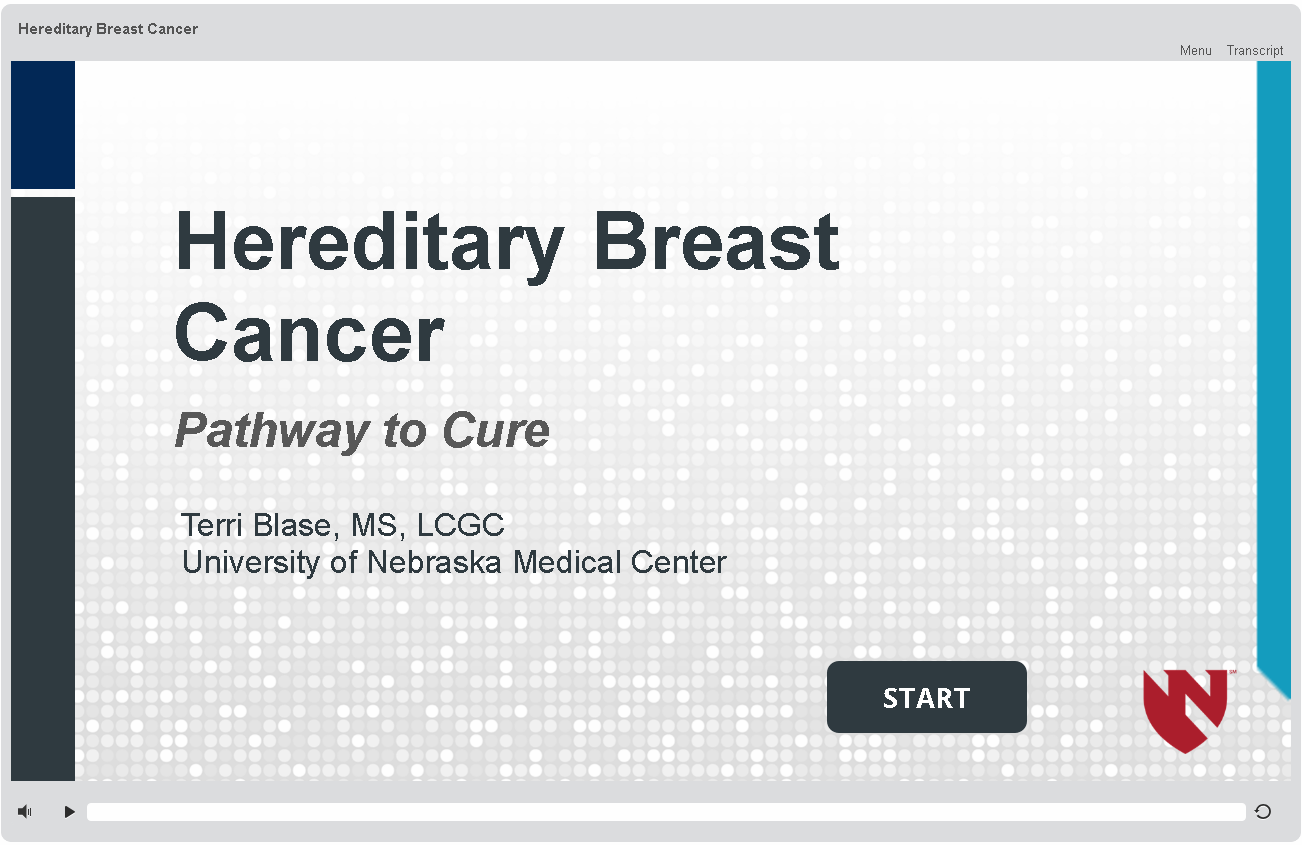Hereditary Breast Cancer
Background for patients:
Cells make up every tissue of the human body and work together to make tissues and organs.
Each cell contains 23 pairs of chromosomes; one set from our biological father and the other from our biological mother. One pair is called the sex chromosomes and determines whether a person is biologically XX (female), or XY (male). The other 22 pairs are "autosomes"responsible for all other functioning of the body.
Chromosomes are composed of genes of DNA. It is through copying parts of the DNA over and over that genes are responsible for making proteins that regulate the functions of the cells and therefore the tissues and organ functions of the body.
We all know that we can "inherit" traits (like hair color) from our biological parents through genes. Disease, or a higher likelihood of developing certain diseases, like cancer, can also be passed to us by our parents. Another way that cancer may develop however is through gene changes in a cell or cells that occur randomly, because of a toxin, or for reasons we don't yet understand. These gene changes are not inherited. Changes in genes may lead to the making of more or less of the normal amount of protein for which a cell gene is responsible. Too much or too little of certain types of proteins causes improper regulation of cell functions. In other words, proteins start turning on too much cell activity (growth for example) or do not prevent improper cell activity from occurring - which can result in cancer (an overgrowth of abnormally functioning cells).
Inherited Breast Cancer Gene Changes
Science is responsible for our ever growing understanding of how genes are responsible for the development of cancers. In 1990, geneticist Mary Claire King, PhD discovered changes (mutations) in what she called the breast cancer gene (abbreviated BRCA1) located on the 17th chromosome. This gene normally restrains breast cells from growing too much, but if changed does not function properly and cancers may develop. Dr. King then identified that this change is also linked to ovarian cancer. Later another breast cancer gene (BRCA2) was also discovered.
Because changes in the BRCA1 and 2 genes are inherited from biological parents these changes are in all the cells of their children and like close relatives (male or female). This does not mean that the change will automatically result in cancer, but it does increase the risk considerably. It is also more likely that when such a change is in a person's cells from birth, that cancer will develop in the earlier years of that person's life, rather than waiting until later years when non-inherited cancers are more likely to be detected. Therefore, early genetic testing and counseling is recommended for certain women and their families who are identify to be at higher risk for breast and ovarian cancer because of their personal and family history of cancer. In 1996, testing for BRCA mutations, using a blood sample, became the first genetic test for cancer of any kind. This was perhaps the beginning of what we call today, "person-centered care" or "personalized-medicine".
Other genetic tests continue to be developed and your health care provider may recommend that you have a "panel" of many genes tested to better understand your risks.
Additionally, tumor cells themselves (once a sample is removed from a persons' body) may be tested for changes in genes. These are not inherited problems, but help your health care providers better understand what may be causing the cancer cells to grow or how fast we might expect these cells to grow based on gene changes.
Scenario & Questions:
Autumn is a 42 year old woman diagnosed with a new invasive ductal breast cancer. She had no history of a prior cancer of any kind. She does recall that her grandmother died of ovarian cancer and her uncle (her father's brother) was treated for breast cancer in his later 40's . Autumn's parents, 45 year old sister, and her 5 year old son are all healthy.
- Should genetic testing and counseling be recommended for Autumn? Why or why not?
- What might we learn from her genetic test?
- Should testing be done before or after the lumpectomy (partial breast removal containing the tumor) she and her surgeon have planned? Why?
Watch the Video on this page to learn more about genes associated with breast cancer, genetic testing, and answers to these and other questions.
